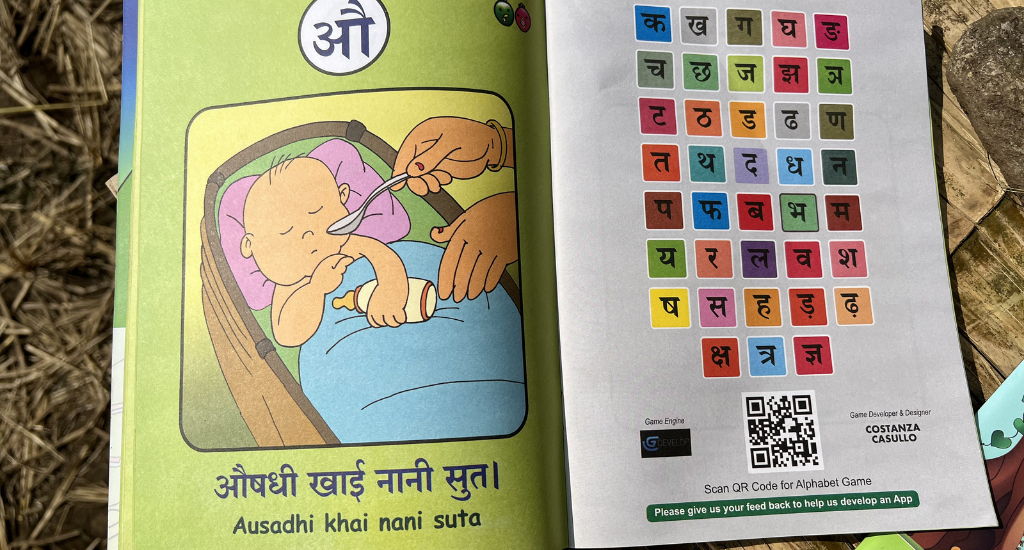
Letters that sing and dance
Warnamala Pariwar, a Kalimpong-based organisation, uses local references to make education more fun for young children by integrating music, animation and games into alphabet lessons.

Warnamala Pariwar, a Kalimpong-based organisation, uses local references to make education more fun for young children by integrating music, animation and games into alphabet lessons.
Deoashish Mothey has been associated with children’s education for as long as he can remember. His parents taught in a primary school at Chamong Tea Garden in Darjeeling district of West Bengal, and comprised the entire faculty that the government-run institution had. Even as a 10-year-old child, Mothey had to step into their role in times of emergency, ‘teaching’ students older than him and maintaining discipline in the school. That’s when he discovered the power of music as an educational tool.
Decades later, Mothey now spearheads Warnamala Pariwar, an organisation working towards integrating music, animation and games into alphabet books. Based in Rambi Bazaar village of Kalimpong district in West Bengal, Warnamala Pariwar is also a four-member music band that aims to sensitise people towards environmental cleanliness through its ‘Teesta Calling’ campaign.
Recalling his childhood, Mothey said, “When my parents fell ill or had to attend to some urgent situation, it used to fall upon me to manage the school.”

He was always inclined towards music and found that singing worked well to keep the students engaged. Music also helped him with his own school education as he was dyslexic.
“I used to face difficulty in recognising different letters,” he recounted. “I then started applying rhymes to make learning easier for myself.”
Mothey spent his childhood picking up musical notes on his own. It was when he joined Santiniketan to pursue graduation in English literature that he realised that his interest lay elsewhere.
Also Read: Arunachal’s Wancho script faces a challenging future
“I didn’t have interest in studying literature,” he recalled. “Had I known that it’s possible to study music in college, I would have opted for that. I changed the stream then.”
Mothey began the Warnamala Pariwar initiative on a small scale, interacting with underprivileged children in his village. Word slowly spread, and reached Gangtok in Sikkim, where Tashi Wangyal, an entrepreneur locally better known as Tango, provided the initial funds for the project. Later a collaboration with some Japanese artists followed to create hand-drawn animations.
“The books currently brought out by us aim to teach the children ‘Bharatiya Nepali’ that is written in the Devnagari script,” he said. “The idea is to make children learn a song in which they unknowingly learn the alphabets.”
Each book carries a QR code which once scanned opens the musical animations on the smartphone. Earlier the books used to come with a CD or pen drive.
For Mothey, it’s been a long struggle to implement the project in schools in his region. For the last several years, he has been making efforts to get government approval to include his book in the school curriculum.
Also Read: Manipur kindergarten kids learn to rock

“Government schools here hardly have any children now, except those who come from very poor families,” he said. “They see initiatives like ours as additional expenditure. But we want to make education more interesting and schools more lively for the students.”
The books have now been included in Sikkim as part of the central government’s Samagra Shiksha Abhiyan – an integrated scheme that ensures school education aligns with Sustainable Development Goal for Education (SDG 4).
Promoting indigenous languages is another cause close to Mothey’s heart. He now wants to create such books in other ethnic languages too, especially those spoken by Himalayan communities like Lepcha, Tamang, Rai and Limbu.
“We are developing a proposal to submit to the state board,” Mothey said, talking about how education in native language makes a huge difference in a child’s learning. The music featured in the book also uses traditional instruments like madal and matka so that students get to know more about their heritage.
“Children today watch mostly foreign content online,” he said. “If education is imparted using local references, it is far more effective.”
Also Read: We just discovered a hidden gem in Darjeeling
The lead image at the top shows Deoashish Mothey (centre) with other members of the Warnamala Pariwar team. (Photo by Sanjana Kaushik)
Pallavi Srivastava is Associate Director – Content at Village Square.